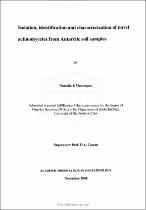Isolation, identification and characterization of novel actinomycetes from Antarctic soil samples
Abstract
Actinomycetes are Gram-positive bacteria that form filamentous branching hyphae with asexual spores. They occur in a variety of environments and are important industrially and pharmaceutically. The aims of this study were to isolate and identify novel actinomycetes from Antarctic soil samples and screen these isolates for the production of secondary metabolites, especially antibiotics. Actinomycetes were successfully isolated from Antarctic Dry Valley soils and optimum growth conditions were determined by investigating the effects of different temperatures and growth media on growth rates. Using phylogenetic (165 rRNA gene sequence), physiological, morphological and biochemical analyses, seven different actinomycete strains were identified, one of which was potentially novel. Isolates were screened for the production of antimicrobial compounds using the disc diffusion and stab culture methods. Antibiotic screening showed that one isolate had antimicrobial activity against eight of the ten bacterial strains tested. Another isolate was observed to inhibit the growth of some contaminating fungi. This observation implied the need to screen isolates for antifungal activity in further studies. Thin layer and high performance liquid chromatography were used in an attempt to characterize the antibiotics.

